Comprehensive Marketing Report: Strategies, Segmentation, and Analysis
VerifiedAdded on 2022/09/09
|16
|1075
|16
Report
AI Summary
This report provides a comprehensive overview of marketing functions, beginning with an introduction to core and support business functions. It delves into market segmentation, explaining its importance in identifying target markets and mitigating marketing strategy risks. The report then explores the product life cycle, detailing its stages and associated challenges. Key marketing concepts such as mass and niche markets, and the unique selling point (USP) are defined and analyzed. Various types of market research, including segmentation testing, advertising testing, and brand awareness analysis, are discussed. The report also outlines marketing strategies based on objectives, resources, and market possibilities, concluding with a list of references. This report is designed to help students understand key marketing concepts and strategies.

Introduction to
Business Function
Marketing
Business Function
Marketing
Paraphrase This Document
Need a fresh take? Get an instant paraphrase of this document with our AI Paraphraser
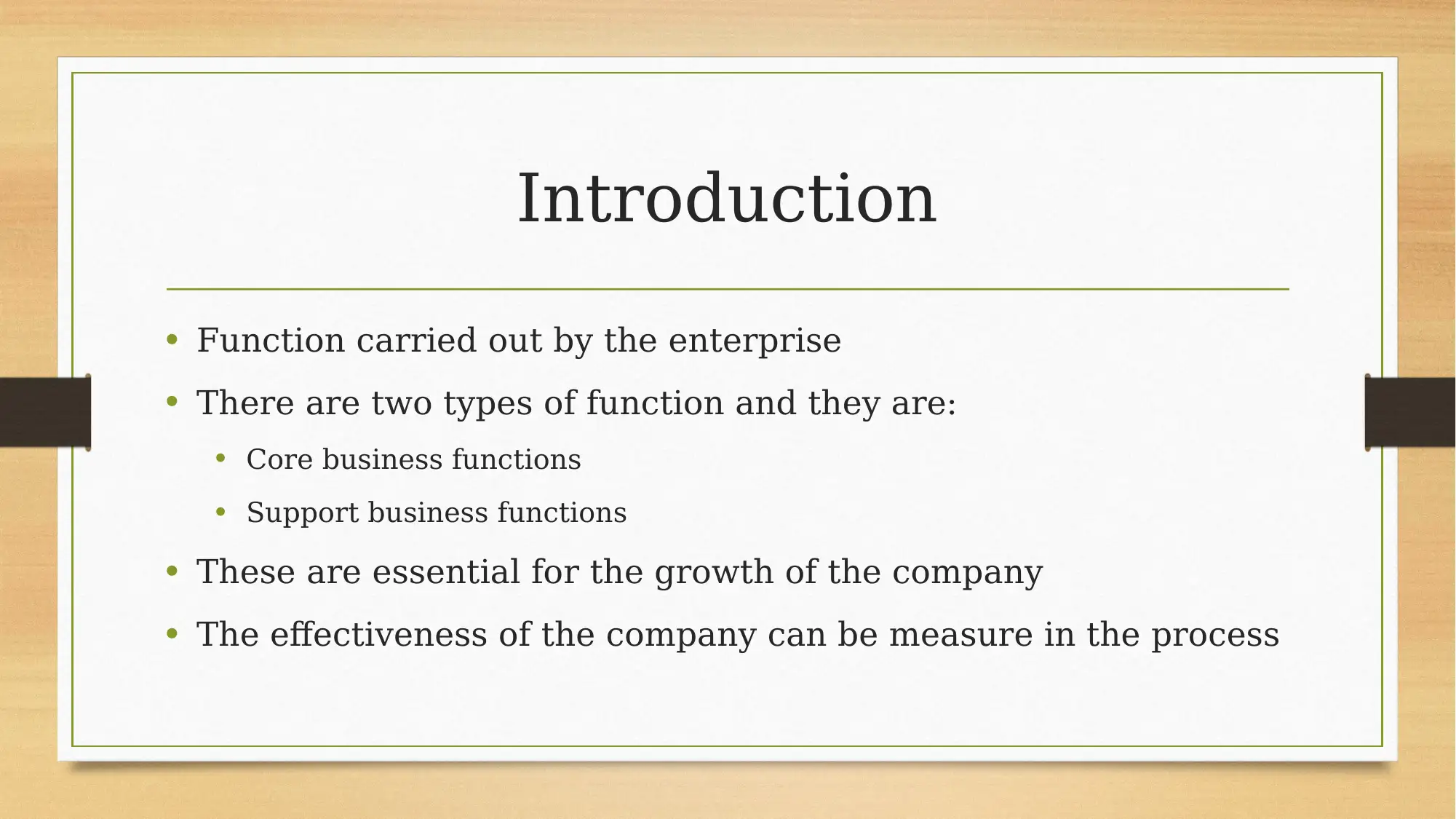
Introduction
• Function carried out by the enterprise
• There are two types of function and they are:
• Core business functions
• Support business functions
• These are essential for the growth of the company
• The effectiveness of the company can be measure in the process
• Function carried out by the enterprise
• There are two types of function and they are:
• Core business functions
• Support business functions
• These are essential for the growth of the company
• The effectiveness of the company can be measure in the process
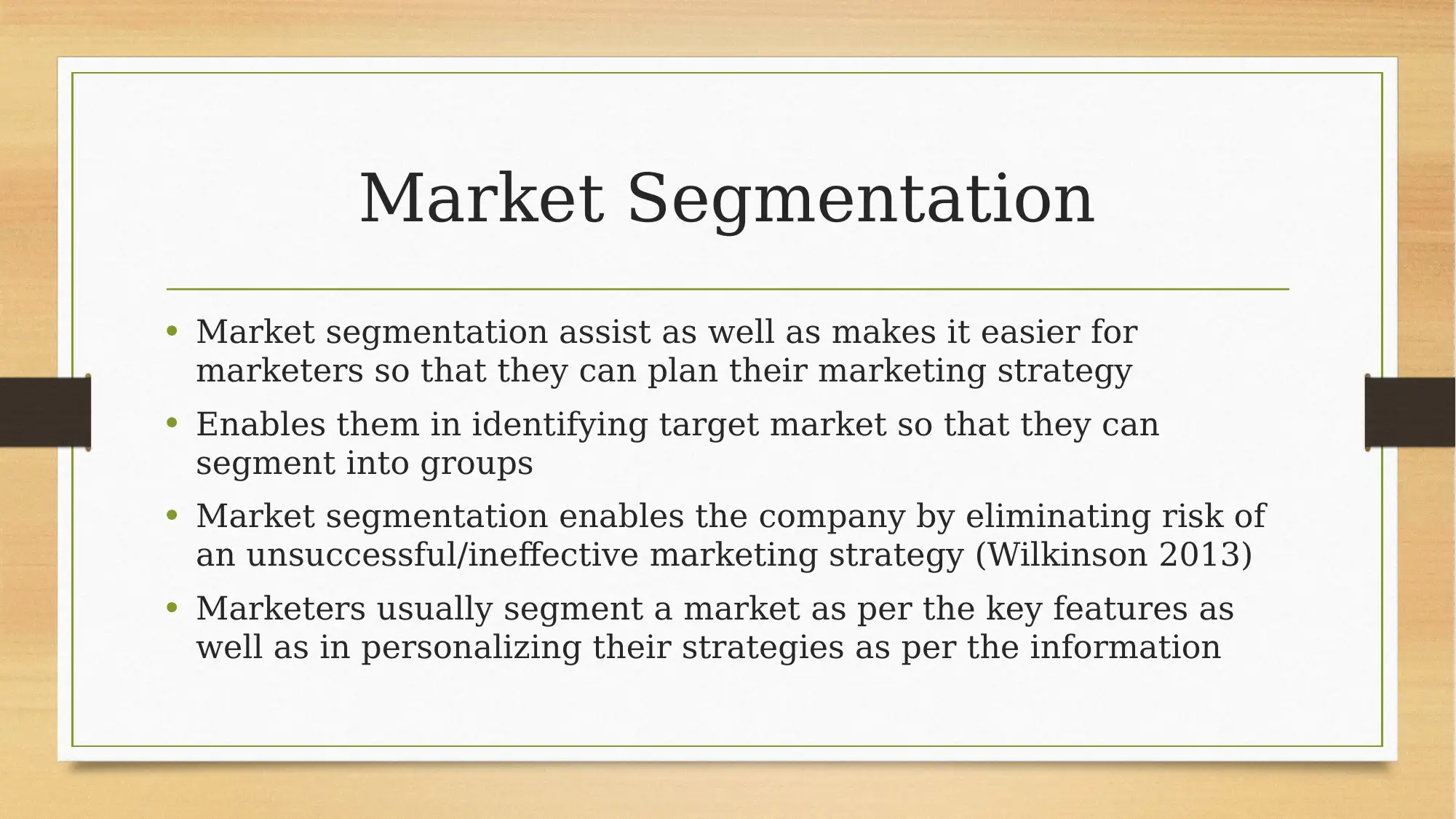
Market Segmentation
• Market segmentation assist as well as makes it easier for
marketers so that they can plan their marketing strategy
• Enables them in identifying target market so that they can
segment into groups
• Market segmentation enables the company by eliminating risk of
an unsuccessful/ineffective marketing strategy (Wilkinson 2013)
• Marketers usually segment a market as per the key features as
well as in personalizing their strategies as per the information
• Market segmentation assist as well as makes it easier for
marketers so that they can plan their marketing strategy
• Enables them in identifying target market so that they can
segment into groups
• Market segmentation enables the company by eliminating risk of
an unsuccessful/ineffective marketing strategy (Wilkinson 2013)
• Marketers usually segment a market as per the key features as
well as in personalizing their strategies as per the information
⊘ This is a preview!⊘
Do you want full access?
Subscribe today to unlock all pages.

Trusted by 1+ million students worldwide
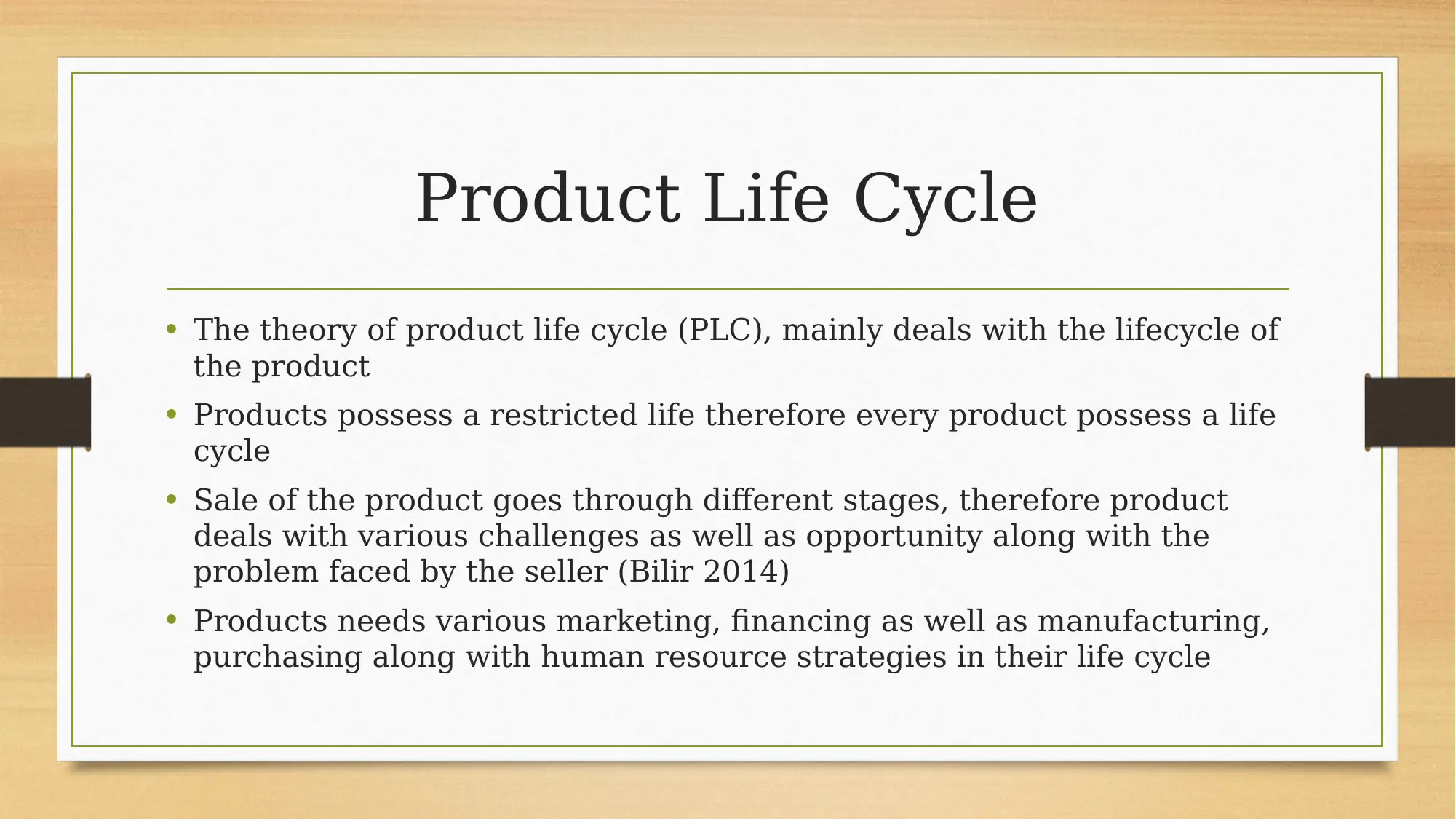
Product Life Cycle
• The theory of product life cycle (PLC), mainly deals with the lifecycle of
the product
• Products possess a restricted life therefore every product possess a life
cycle
• Sale of the product goes through different stages, therefore product
deals with various challenges as well as opportunity along with the
problem faced by the seller (Bilir 2014)
• Products needs various marketing, financing as well as manufacturing,
purchasing along with human resource strategies in their life cycle
• The theory of product life cycle (PLC), mainly deals with the lifecycle of
the product
• Products possess a restricted life therefore every product possess a life
cycle
• Sale of the product goes through different stages, therefore product
deals with various challenges as well as opportunity along with the
problem faced by the seller (Bilir 2014)
• Products needs various marketing, financing as well as manufacturing,
purchasing along with human resource strategies in their life cycle
Paraphrase This Document
Need a fresh take? Get an instant paraphrase of this document with our AI Paraphraser
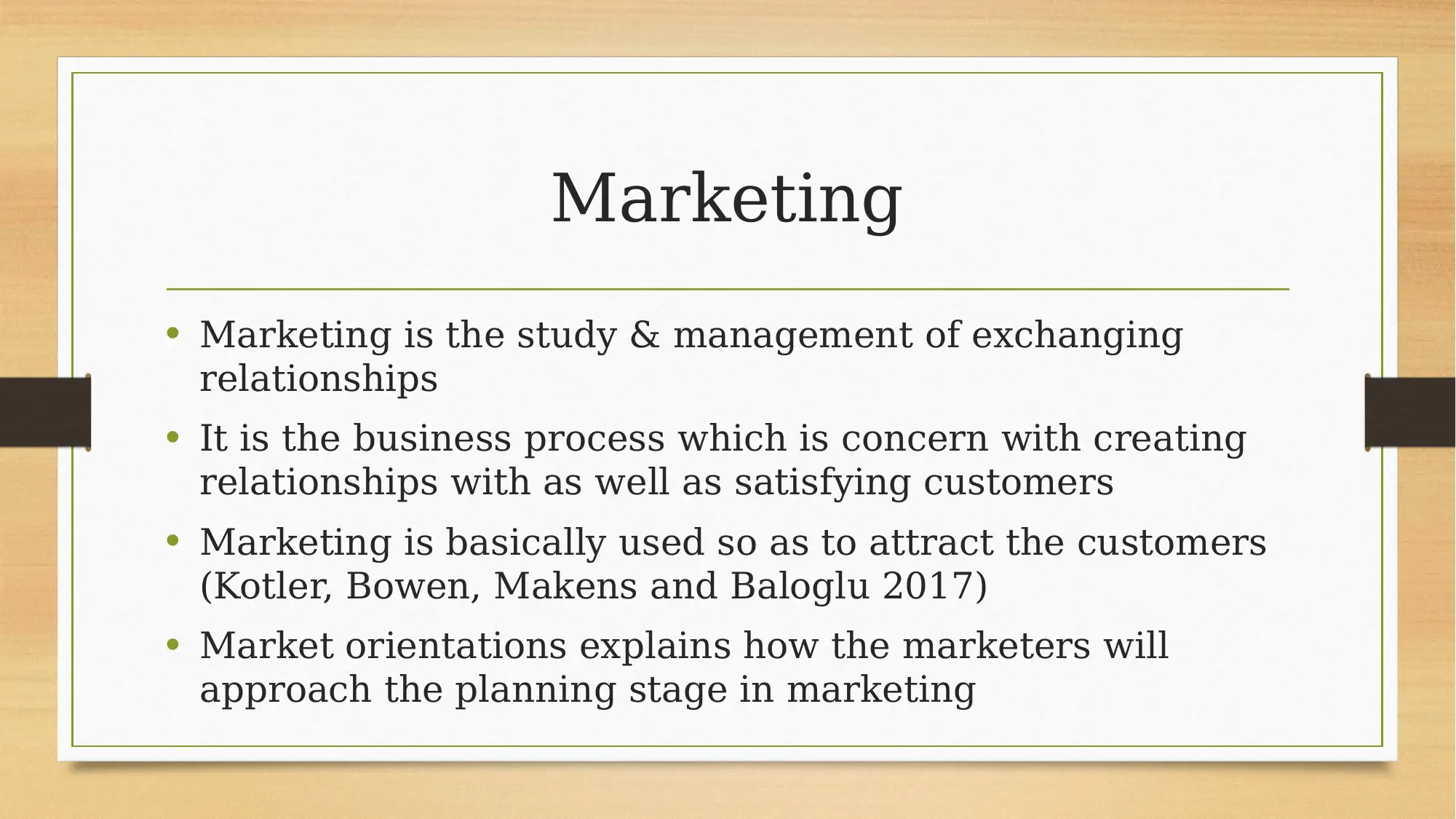
Marketing
• Marketing is the study & management of exchanging
relationships
• It is the business process which is concern with creating
relationships with as well as satisfying customers
• Marketing is basically used so as to attract the customers
(Kotler, Bowen, Makens and Baloglu 2017)
• Market orientations explains how the marketers will
approach the planning stage in marketing
• Marketing is the study & management of exchanging
relationships
• It is the business process which is concern with creating
relationships with as well as satisfying customers
• Marketing is basically used so as to attract the customers
(Kotler, Bowen, Makens and Baloglu 2017)
• Market orientations explains how the marketers will
approach the planning stage in marketing
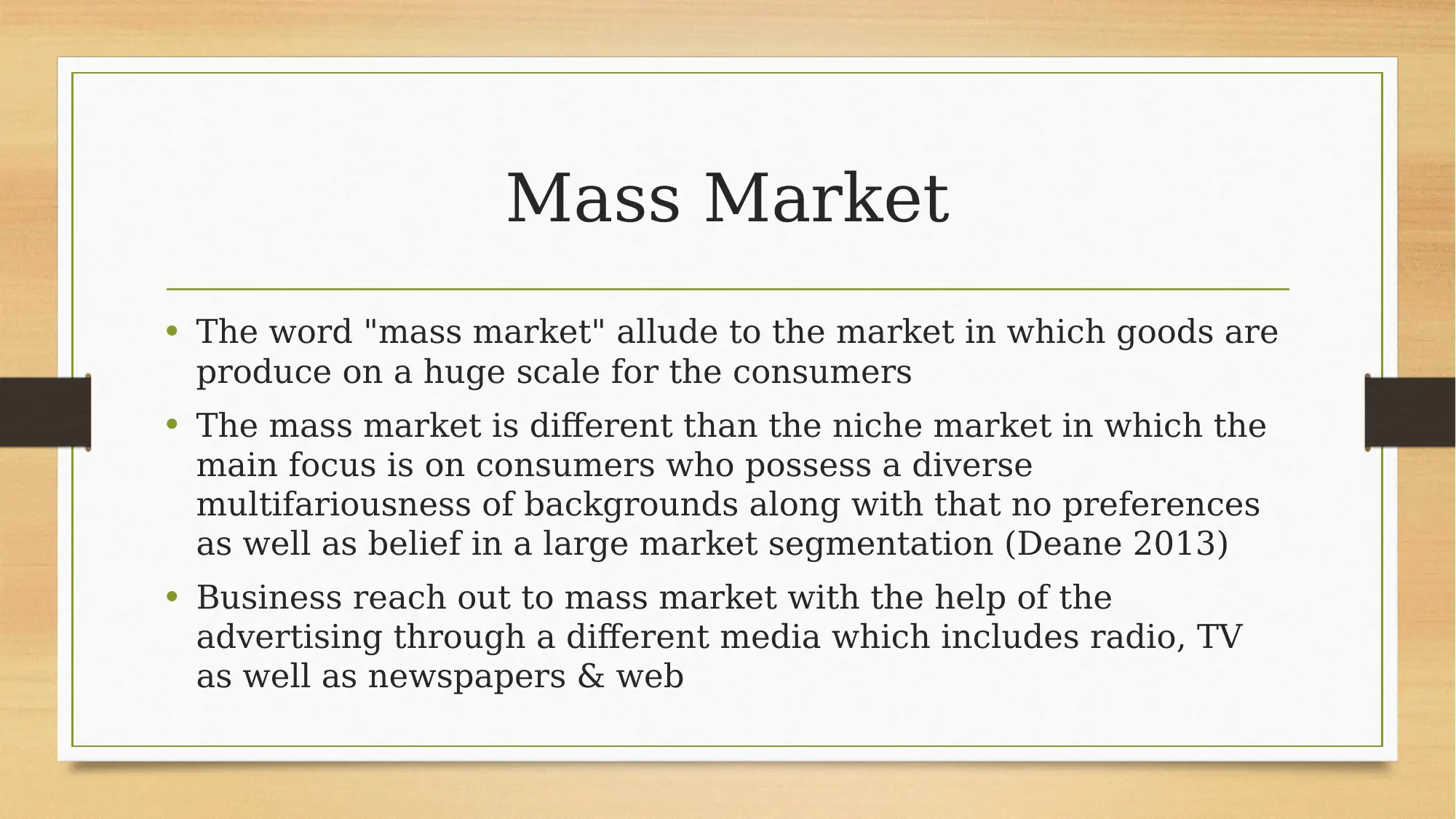
Mass Market
• The word "mass market" allude to the market in which goods are
produce on a huge scale for the consumers
• The mass market is different than the niche market in which the
main focus is on consumers who possess a diverse
multifariousness of backgrounds along with that no preferences
as well as belief in a large market segmentation (Deane 2013)
• Business reach out to mass market with the help of the
advertising through a different media which includes radio, TV
as well as newspapers & web
• The word "mass market" allude to the market in which goods are
produce on a huge scale for the consumers
• The mass market is different than the niche market in which the
main focus is on consumers who possess a diverse
multifariousness of backgrounds along with that no preferences
as well as belief in a large market segmentation (Deane 2013)
• Business reach out to mass market with the help of the
advertising through a different media which includes radio, TV
as well as newspapers & web
⊘ This is a preview!⊘
Do you want full access?
Subscribe today to unlock all pages.

Trusted by 1+ million students worldwide
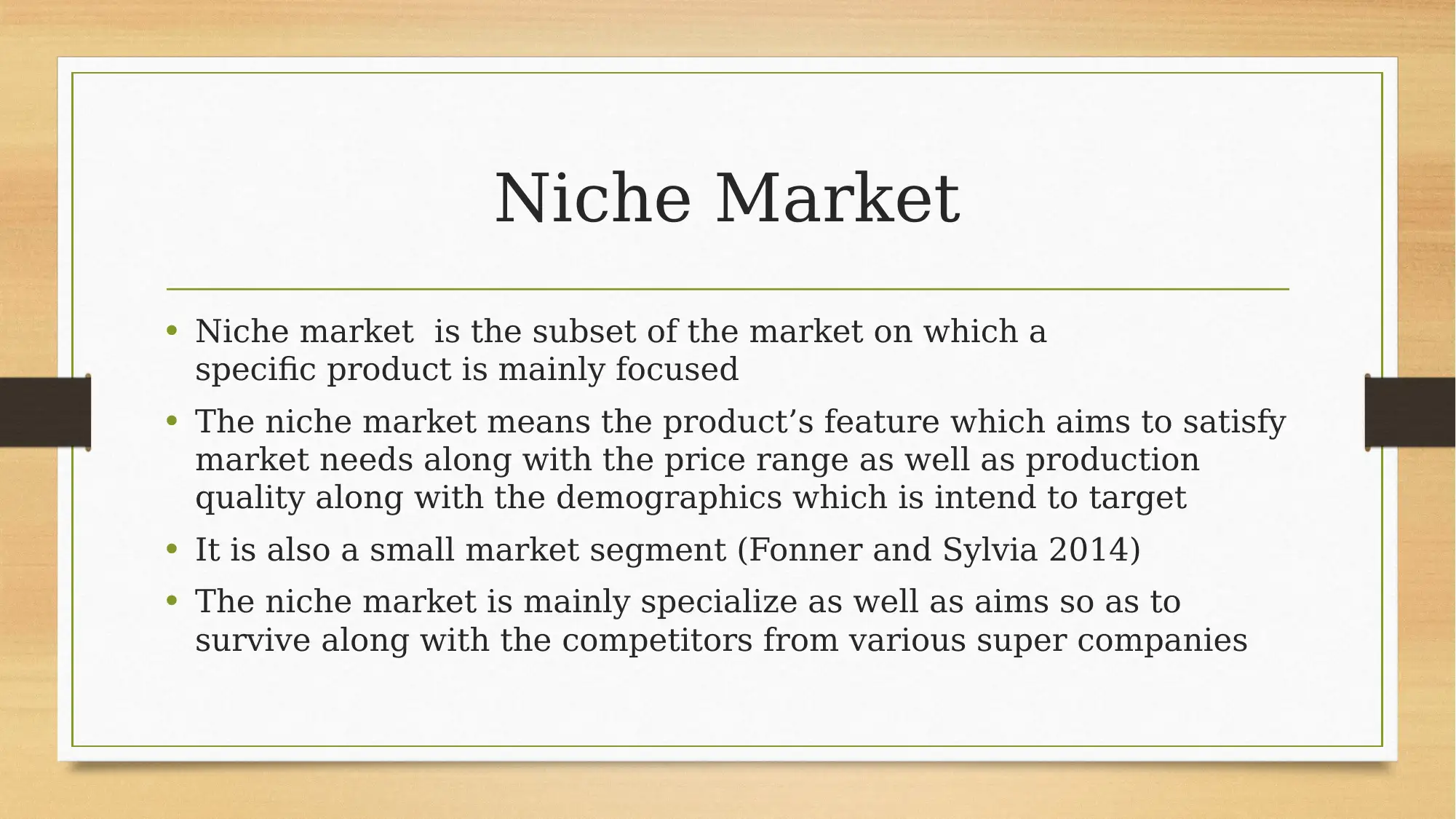
Niche Market
• Niche market is the subset of the market on which a
specific product is mainly focused
• The niche market means the product’s feature which aims to satisfy
market needs along with the price range as well as production
quality along with the demographics which is intend to target
• It is also a small market segment (Fonner and Sylvia 2014)
• The niche market is mainly specialize as well as aims so as to
survive along with the competitors from various super companies
• Niche market is the subset of the market on which a
specific product is mainly focused
• The niche market means the product’s feature which aims to satisfy
market needs along with the price range as well as production
quality along with the demographics which is intend to target
• It is also a small market segment (Fonner and Sylvia 2014)
• The niche market is mainly specialize as well as aims so as to
survive along with the competitors from various super companies
Paraphrase This Document
Need a fresh take? Get an instant paraphrase of this document with our AI Paraphraser
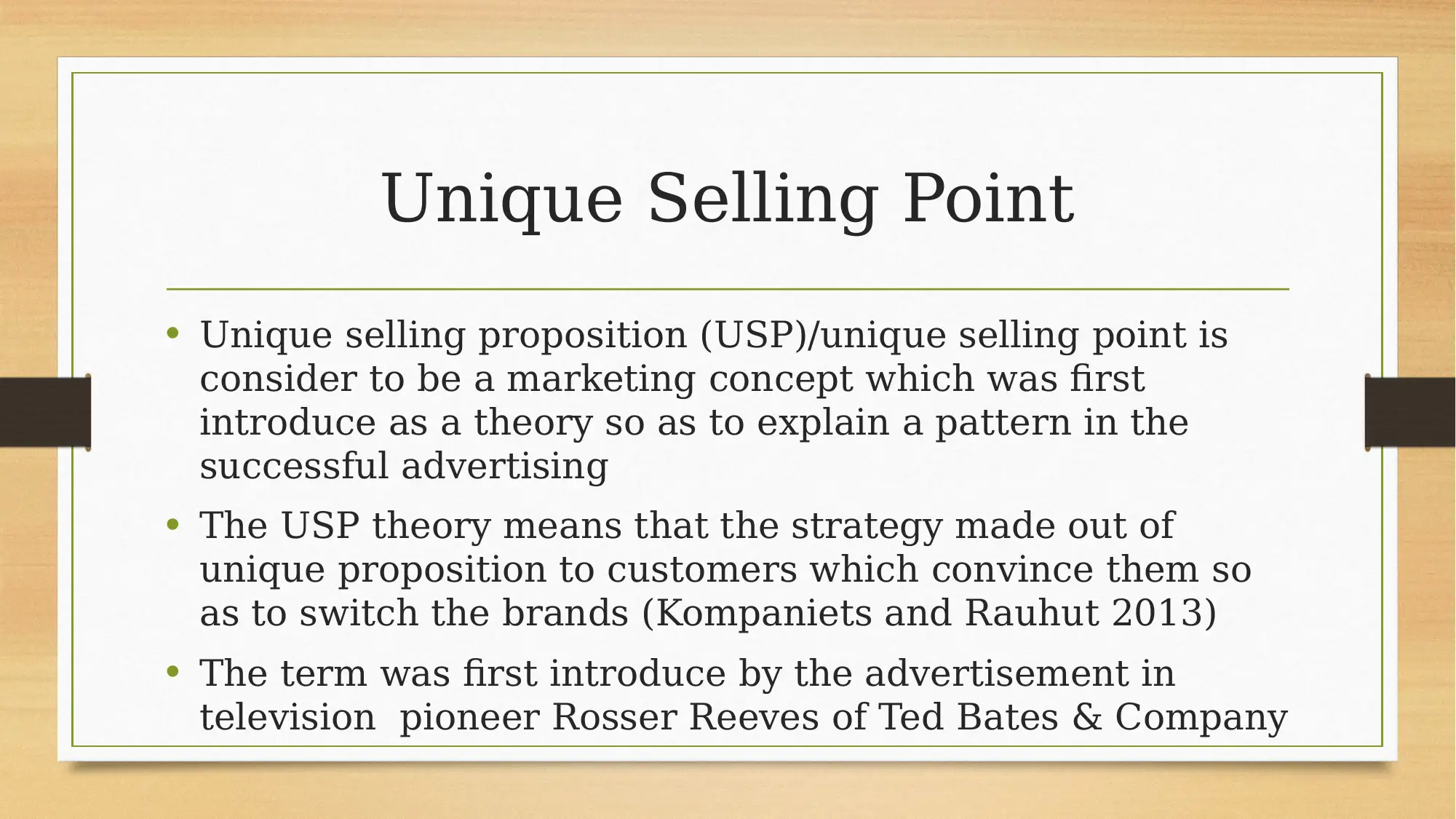
Unique Selling Point
• Unique selling proposition (USP)/unique selling point is
consider to be a marketing concept which was first
introduce as a theory so as to explain a pattern in the
successful advertising
• The USP theory means that the strategy made out of
unique proposition to customers which convince them so
as to switch the brands (Kompaniets and Rauhut 2013)
• The term was first introduce by the advertisement in
television pioneer Rosser Reeves of Ted Bates & Company
• Unique selling proposition (USP)/unique selling point is
consider to be a marketing concept which was first
introduce as a theory so as to explain a pattern in the
successful advertising
• The USP theory means that the strategy made out of
unique proposition to customers which convince them so
as to switch the brands (Kompaniets and Rauhut 2013)
• The term was first introduce by the advertisement in
television pioneer Rosser Reeves of Ted Bates & Company
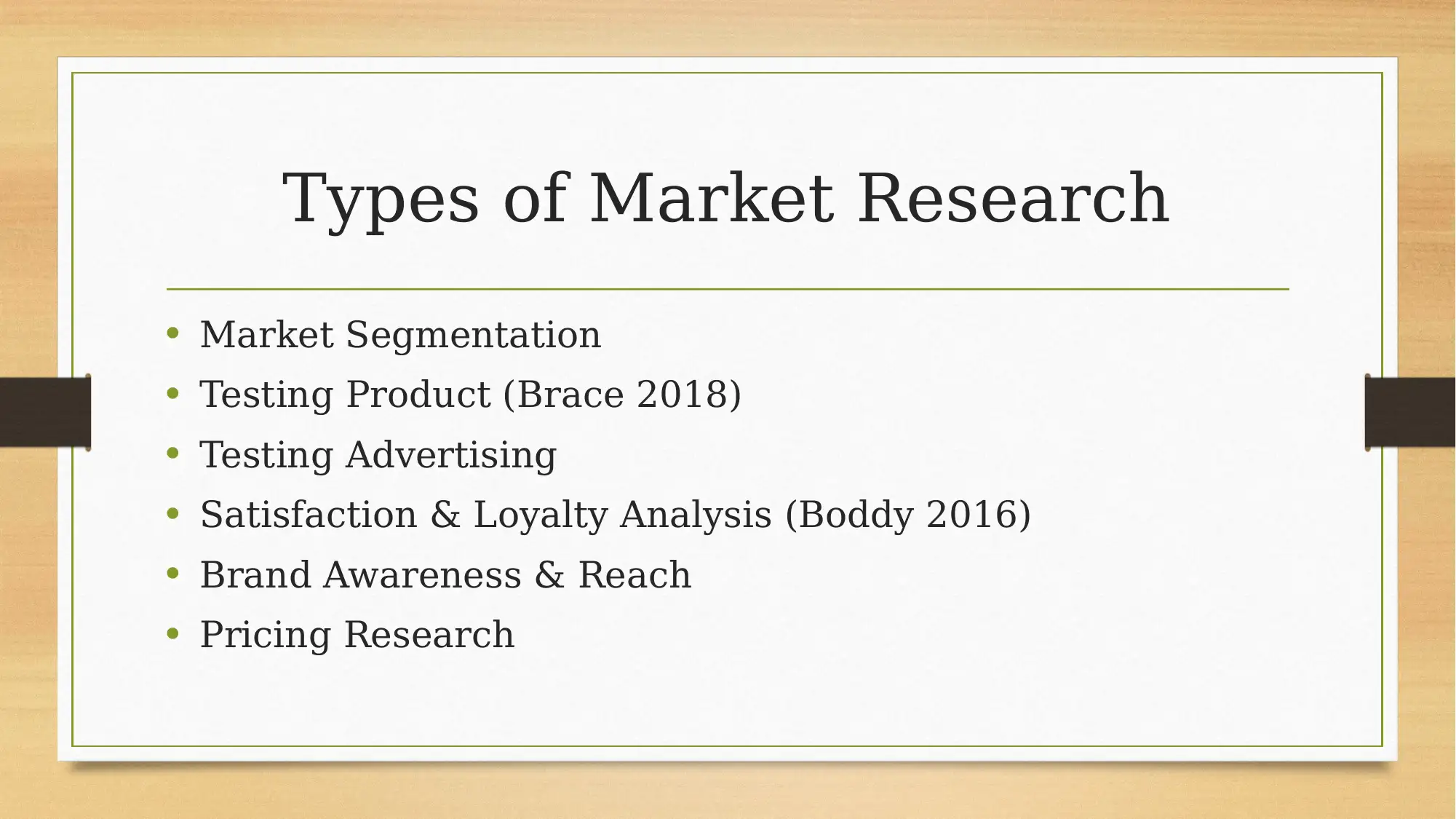
Types of Market Research
• Market Segmentation
• Testing Product (Brace 2018)
• Testing Advertising
• Satisfaction & Loyalty Analysis (Boddy 2016)
• Brand Awareness & Reach
• Pricing Research
• Market Segmentation
• Testing Product (Brace 2018)
• Testing Advertising
• Satisfaction & Loyalty Analysis (Boddy 2016)
• Brand Awareness & Reach
• Pricing Research
⊘ This is a preview!⊘
Do you want full access?
Subscribe today to unlock all pages.

Trusted by 1+ million students worldwide
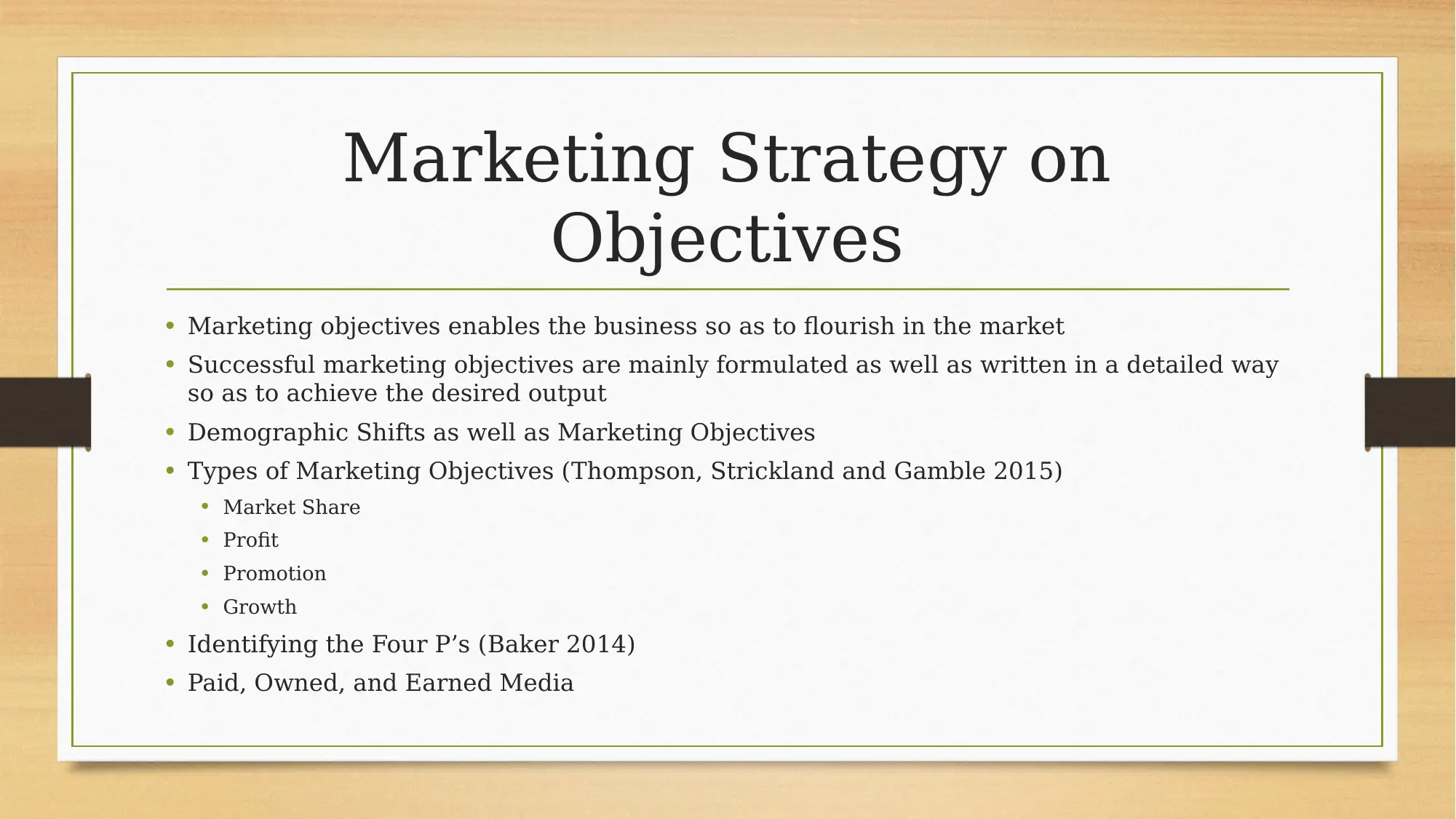
Marketing Strategy on
Objectives
• Marketing objectives enables the business so as to flourish in the market
• Successful marketing objectives are mainly formulated as well as written in a detailed way
so as to achieve the desired output
• Demographic Shifts as well as Marketing Objectives
• Types of Marketing Objectives (Thompson, Strickland and Gamble 2015)
• Market Share
• Profit
• Promotion
• Growth
• Identifying the Four P’s (Baker 2014)
• Paid, Owned, and Earned Media
Objectives
• Marketing objectives enables the business so as to flourish in the market
• Successful marketing objectives are mainly formulated as well as written in a detailed way
so as to achieve the desired output
• Demographic Shifts as well as Marketing Objectives
• Types of Marketing Objectives (Thompson, Strickland and Gamble 2015)
• Market Share
• Profit
• Promotion
• Growth
• Identifying the Four P’s (Baker 2014)
• Paid, Owned, and Earned Media
Paraphrase This Document
Need a fresh take? Get an instant paraphrase of this document with our AI Paraphraser
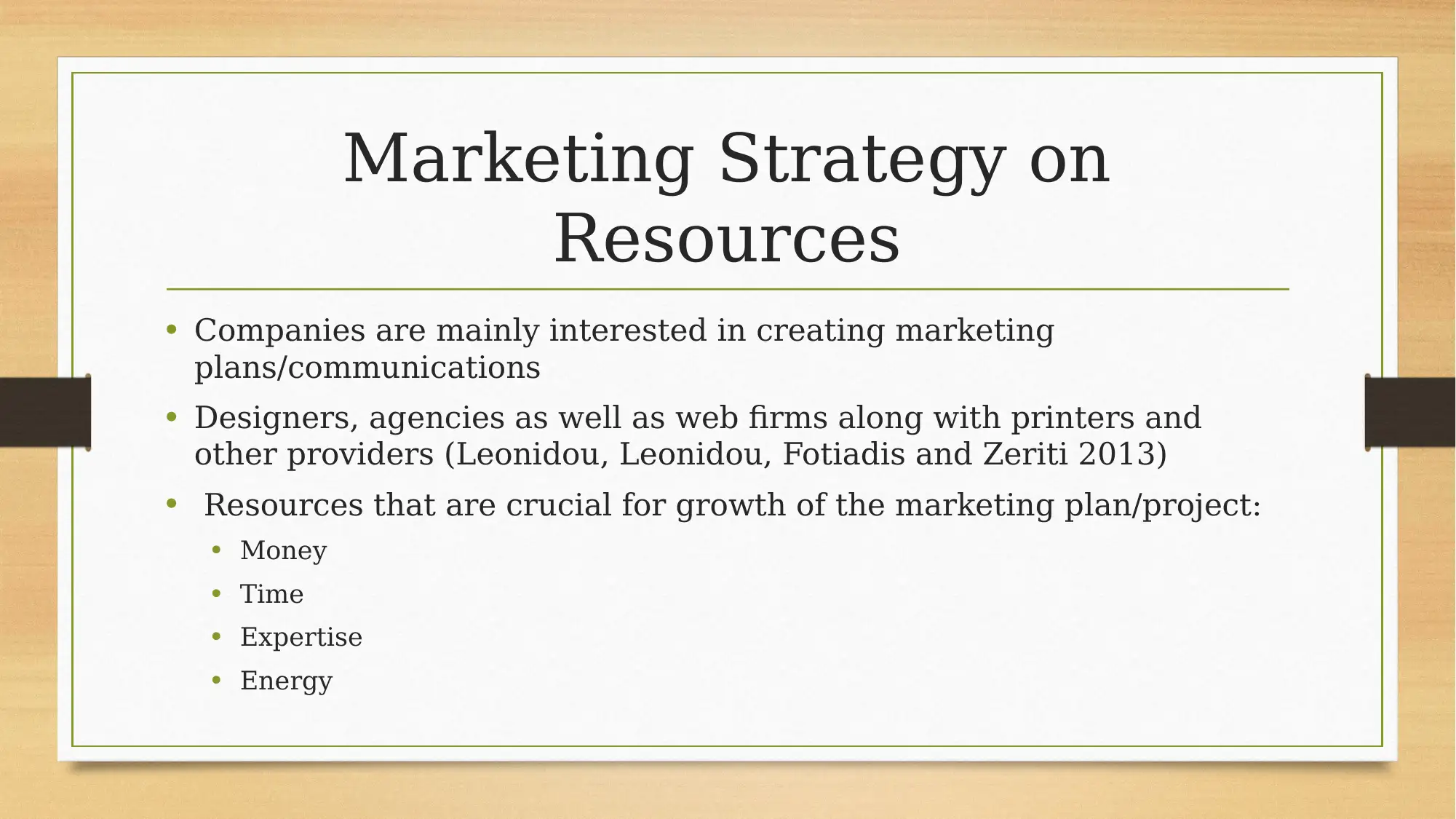
Marketing Strategy on
Resources
• Companies are mainly interested in creating marketing
plans/communications
• Designers, agencies as well as web firms along with printers and
other providers (Leonidou, Leonidou, Fotiadis and Zeriti 2013)
• Resources that are crucial for growth of the marketing plan/project:
• Money
• Time
• Expertise
• Energy
Resources
• Companies are mainly interested in creating marketing
plans/communications
• Designers, agencies as well as web firms along with printers and
other providers (Leonidou, Leonidou, Fotiadis and Zeriti 2013)
• Resources that are crucial for growth of the marketing plan/project:
• Money
• Time
• Expertise
• Energy
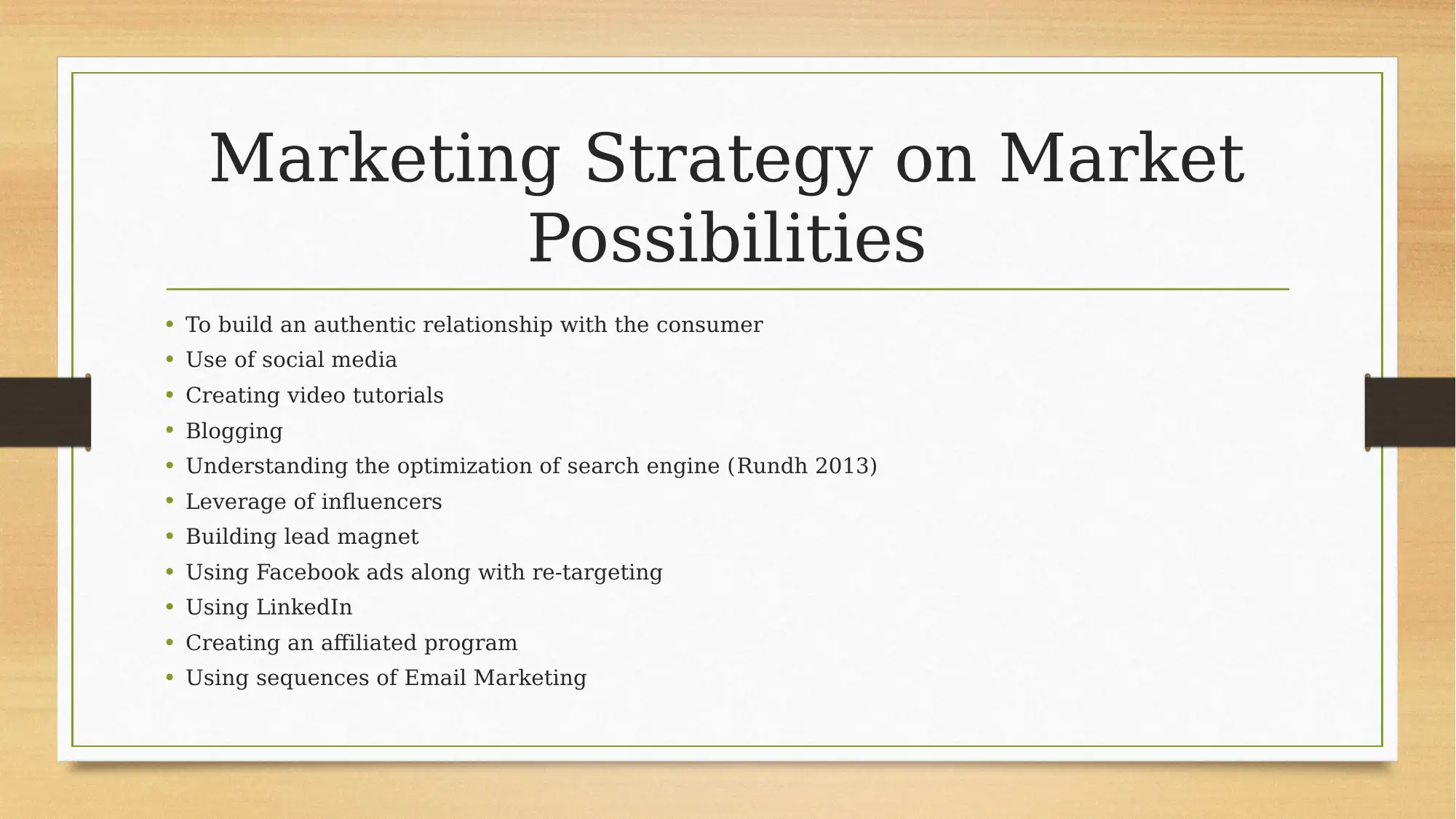
Marketing Strategy on Market
Possibilities
• To build an authentic relationship with the consumer
• Use of social media
• Creating video tutorials
• Blogging
• Understanding the optimization of search engine (Rundh 2013)
• Leverage of influencers
• Building lead magnet
• Using Facebook ads along with re-targeting
• Using LinkedIn
• Creating an affiliated program
• Using sequences of Email Marketing
Possibilities
• To build an authentic relationship with the consumer
• Use of social media
• Creating video tutorials
• Blogging
• Understanding the optimization of search engine (Rundh 2013)
• Leverage of influencers
• Building lead magnet
• Using Facebook ads along with re-targeting
• Using LinkedIn
• Creating an affiliated program
• Using sequences of Email Marketing
⊘ This is a preview!⊘
Do you want full access?
Subscribe today to unlock all pages.

Trusted by 1+ million students worldwide
1 out of 16
Related Documents
Your All-in-One AI-Powered Toolkit for Academic Success.
+13062052269
info@desklib.com
Available 24*7 on WhatsApp / Email
![[object Object]](/_next/static/media/star-bottom.7253800d.svg)
Unlock your academic potential
Copyright © 2020–2025 A2Z Services. All Rights Reserved. Developed and managed by ZUCOL.





![Marketing Analysis of Companies Assignment - [University Name]](/_next/image/?url=https%3A%2F%2Fdesklib.com%2Fmedia%2Fimages%2Fym%2F52b2c4cd604e4d6d811166577ee2f21b.jpg&w=256&q=75)